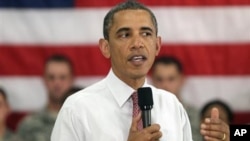A day after announcing the beginning of a U.S. troop drawdown in Afghanistan, President Barack Obama on Thursday visited soldiers and their families at Fort Drum, New York, home to one of the most frequently deployed units in the U.S. military.
Fort Drum is home to the 10th Mountain Division, which is has seen several deployments in Afghanistan as well as in Iraq, where U.S. forces have formally ended their combat role. Members of the division have been among some of the most recent military deaths in combat operations in Afghanistan.
In 2009, President Obama posthumously awarded the Medal of Honor, the U.S. military's highest decoration for valor, to U.S. Army Sergeant First Class Jared Monti, a member of the Mountain Division, who was killed in Afghanistan.
Under President Obama's phased withdrawal plan, 10,000 soldiers will leave Afghanistan by the end of this year. At what he calls "a steady pace," another 23,000 will leave by September of next year.
At Fort Drum, the president told soldiers they have always been in the "toughest fights" and that it is their commitment that made possible the progress seen in Afghanistan.
"The only reason I was able to make that decision was because I knew we had the finest fighting force in the world, and that if I gave a command to our troops, they would be able to accomplish that mission," said President Obama.
Referring to his speech on Wednesday, Mr. Obama said U.S. forces will be drawn down steadily, not precipitously, to ensure that gains will be sustained.
He said it was the work of the U.S. military that made possible the operation against terrorist leader Osama bin-Laden in Pakistan.
"It is also because of you that we had the platform to be able to go after bin Laden and al-Qaida," said Obama. "And we have decimated their ranks."
In an interview with VOA on Wednesday, President Obama discussed the withdrawals, progress made against the Taliban and the path forward to turning security responsibilities over to Afghan government forces.
"We’ll continue to transition as Afghan forces stand up, with the goal of completing this transition by 2014," said President Obama. "Beyond 2014, though, we want to make sure that we maintain the strong relationship with the Afghan people and the Afghan government. We won’t have the same military presence, but what we hope on economic and development agendas that we’re going to continue to work with Afghans as we have."
At a hearing on Capitol Hill, lawmakers questioned outgoing Joint Chiefs of Staff Chairman U.S. Navy Admiral Michael Mullen about President Obama's withdrawal plan.
Mullen responded to a question about the 2014 target date for the United States and NATO to transfer all security responsibilities in the country to Afghan forces.
"As much advise and assist as is necessary by that point, but what we have watched in terms of both the growth rate and learning rate, they are on a pretty good glide slope right now in terms of ascendance to be able to do this - the Afghan security forces," said Admiral Mullen.
Republican House of Representatives Speaker John Boehner urged the president to retain flexibility to alter the withdrawal plan based on conditions on the ground.
Boehner and the Democratic House Minority Leader Nancy Pelosi spoke to reporters on Capitol Hill.
Boehner: "I am generally supportive of the plan because there is enough flexibility in the withdrawal to take into consideration conditions on the ground."
Pelosi: "Many of us would like to see this go faster than the path that was laid out, however it may."
Some of the sharpest critics of the war in Afghanistan took to the floor of the House of Representatives on Thursday, calling the withdrawal plan insufficient.
Obama Visits Troops After Announcing Afghanistan Drawdown
- By Dan Robinson





